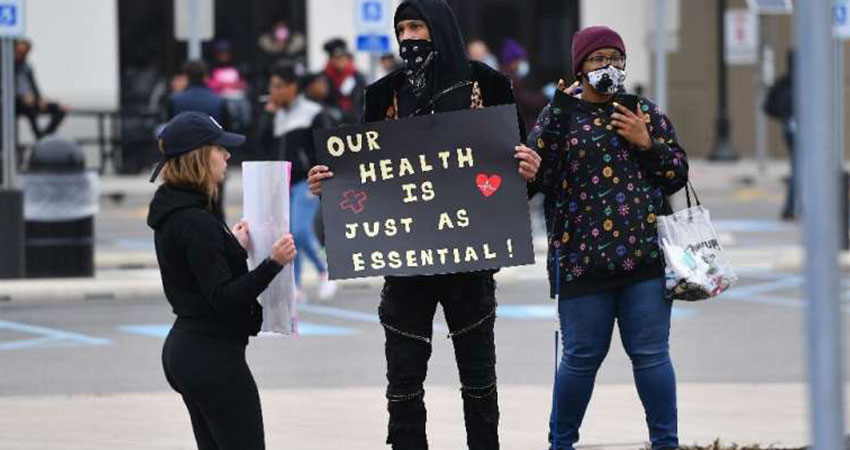Amazon workers walk off at a facility in Staten Island, NY (photo credit: Techxsplore)
While ecommerce fulfillment was initially thought to be a boon during the coronavirus crisis, with stores and malls in lockdown, execution is proving to be anything but simple as a growing chorus of drivers and facility associates complain about the danger of exposure and even walk off the job in protest.
Between Amazon, Whole Foods and Instacart workers staging walkouts Monday – with the former firing the organizer – and growing reports of drivers testing positive for COVID-19, getting orders out to customers is proving a huge challenge. Amazon Prime orders continue to face long delays, while the company is grabbing FC workers to pick Whole Foods grocery orders, offering higher pay.
Amazon in general is groaning under the strain of an unexpected peak season, for which it had two weeks instead of months to prepare in terms of staffing, facilities and the supply chain. Truckers, along with nurses and medical workers, have become heroes amid the crisis, getting vital goods where they need to go as most everything else is shut down.
Grocers are starting to limit the number of customers in a store at one time, and curbside pickup and home delivery continue to boom – but be prepared to wait for deliveries from Instacart or Postmates, in some cases a day or two. Also, some states are banning reusable bags over virus transmission concerns.
More reports are coming in of grocery workers being infected with coronavirus, including at three different grocery stores in California as well as a Costco, a not-unexpected result given their exposure to so many shoppers relative to others in retail.
UPS and FedEx along with the U.S. Postal Service and DHL have suspended their normal service guarantee of a refund if a delivery arrives late, and UPS and FedEx are offering discounts for air express and ground services; a FedEx spokesperson said it was unrelated to the coronavirus outbreak. Amazon is saying Prime customers can face delays up to a month for nonessential orders.
To ease the strain on third-party sellers already impacted by Amazon’s mid-March decision to temporarily suspend nonessential orders until April 4, the company on Monday said it was waiving two weeks of storage fees in March, according to Reuters. The break applied to shippers and goods stored in the U.S., UK, Germany, France, Italy, Spain, Poland, the Czech Republic and Canada.
According to a report from DHL, export challenges from China and India are severely impacting the pharmaceutical industry, as those countries produce much of the world’s generic drug ingredients and formulations.
“As the full effects on pharma supply chains as a result of the COVID-19 outbreak in China becomes more evident, supply chain managers should diversify their sourcing locations, seek alternative transportation capacity to move cargo, and rethink their manufacturing and sourcing network,” DHL said in its report.
On the pharmacy side, Walgreens expanded its partnership with Postmates, offering on-demand delivery from all 7,000 U.S. stores, the companies announced.
Tim Geiken, principal of shipping consultancy Platinum Circle Partners, said he heard that the coronavirus pandemic is having more impact on the operations of UPS’s ground network than that of rival FedEx, as UPS’s union workers get paid sick days and sick leave while FedEx’s contract drivers don’t.
“All the business closures are causing a problem (for the carriers),” Geiken said. “Their networks are not built to store stuff but to move it through and deliver it. If people continue to ship orders and businesses are closed and not able to receive them, that’s going to be a mess. We have to keep an eye on that, with trailers of stuff sitting in lots. They can’t risk shipping it back because what if it can’t be accepted on the other end?”
Geiken said the only customers of Platinum Circle Partners that are shipping product currently are in big box retail, home improvement, medical equipment and supplies and chemical products.
John Haber, founder and CEO of Spend Management Experts, said some of his clients are seeking to get reclassified as sellers of essential products in order to bypass government-imposed shutdowns. One is a manufacturer that supplies other businesses considered essential, while another sells musical instruments. Guitar Center has been trying to make that case as well.
“It depends on the state, but we are seeing a lot of shipping still going on with most of our customers,” Haber said. “We only have a few who have shut down entirely. In that case, it’s mostly customers who don’t have multiple distribution centers but just one. A customer in New Hampshire, for example, had to shut down because of an order from the governor.”

